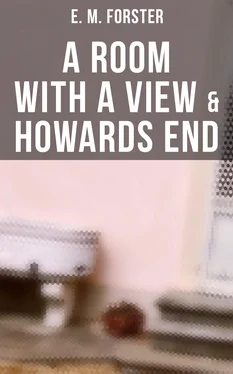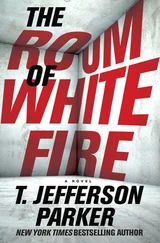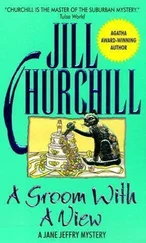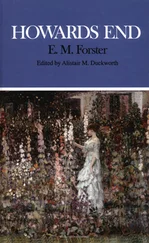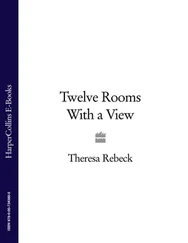1 ...8 9 10 12 13 14 ...28 Here he stopped again, and glanced suspiciously to right and left, like a rabbit that is going to bolt into its hole. A block of flats, constructed with extreme cheapness, towered on either hand. Farther down the road two more blocks were being built, and beyond these an old house was being demolished to accommodate another pair. It was the kind of scene that may be observed all over London, whatever the locality—bricks and mortar rising and falling with the restlessness of the water in a fountain, as the city receives more and more men upon her soil. Camelia Road would soon stand out like a fortress, and command, for a little, an extensive view. Only for a little. Plans were out for the erection of flats in Magnolia Road also. And again a few years, and all the flats in either road might be pulled down, and new buildings, of a vastness at present unimaginable, might arise where they had fallen.
"Evening, Mr. Bast."
"Evening, Mr. Cunningham."
"Very serious thing this decline of the birth-rate in Manchester."
"I beg your pardon?"
"Very serious thing this decline of the birth-rate in Manchester," repeated Mr. Cunningham, tapping the Sunday paper, in which the calamity in question had just been announced to him.
"Ah, yes," said Leonard, who was not going to let on that he had not bought a Sunday paper.
"If this kind of thing goes on the population of England will be stationary in 1960."
"You don't say so."
"I call it a very serious thing, eh?"
"Good-evening, Mr. Cunningham."
"Good-evening, Mr. Bast."
Then Leonard entered Block B of the flats, and turned, not upstairs, but down, into what is known to house agents as a semi-basement, and to other men as a cellar. He opened the door, and cried "Hullo!" with the pseudo-geniality of the Cockney. There was no reply. "Hullo!" he repeated. The sitting-room was empty, though the electric light had been left burning. A look of relief came over his face, and he flung himself into the armchair.
The sitting-room contained, besides the armchair, two other chairs, a piano, a three-legged table, and a cosy corner. Of the walls, one was occupied by the window, the other by a draped mantelshelf bristling with Cupids. Opposite the window was the door, and beside the door a bookcase, while over the piano there extended one of the masterpieces of Maud Goodman. It was an amorous and not unpleasant little hole when the curtains were drawn, and the lights turned on, and the gas-stove unlit. But it struck that shallow makeshift note that is so often heard in the modem dwelling-place. It had been too easily gained, and could be relinquished too easily.
As Leonard was kicking off his boots he jarred the three-legged table, and a photograph frame, honourably poised upon it, slid sideways, fell off into the fireplace, and smashed. He swore in a colourless sort of way, and picked the photograph up. It represented a young lady called Jacky, and had been taken at the time when young ladies called Jacky were often photographed with their mouths open. Teeth of dazzling whiteness extended along either of Jacky's jaws, and positively weighted her head sideways, so large were they and so numerous. Take my word for it, that smile was simply stunning, and it is only you and I who will be fastidious, and complain that true joy begins in the eyes, and that the eyes of Jacky did not accord with her smile, but were anxious and hungry.
Leonard tried to pull out the fragments of glass, and cut his fingers and swore again. A drop of blood fell on the frame, another followed, spilling over on to the exposed photograph. He swore more vigorously, and dashed to the kitchen, where he bathed his hands. The kitchen was the same size as the sitting room; through it was a bedroom. This completed his home. He was renting the flat furnished: of all the objects that encumbered it none were his own except the photograph frame, the Cupids, and the books.
"Damn, damn, damnation!" he murmured, together with such other words as he had learnt from older men. Then he raised his hand to his forehead and said, "Oh, damn it all—" which meant something different. He pulled himself together. He drank a little tea, black and silent, that still survived upon an upper shelf. He swallowed some dusty crumbs of cake. Then he went back to the sitting-room, settled himself anew, and began to read a volume of Ruskin.
"Seven miles to the north of Venice—"
How perfectly the famous chapter opens! How supreme its command of admonition and of poetry! The rich man is speaking to us from his gondola.
"Seven miles to the north of Venice the banks of sand which nearer the city rise little above low-water mark attain by degrees a higher level, and knit themselves at last into fields of salt morass, raised here and there into shapeless mounds, and intercepted by narrow creeks of sea."
Leonard was trying to form his style on Ruskin: he understood him to be the greatest master of English Prose. He read forward steadily, occasionally making a few notes.
"Let us consider a little each of these characters in succession, and first (for of the shafts enough has been said already), what is very peculiar to this church—its luminousness."
Was there anything to be learnt from this fine sentence? Could he adapt it to the needs of daily life? Could he introduce it, with modifications, when he next wrote a letter to his brother, the lay-reader? For example—
"Let us consider a little each of these characters in succession, and first (for of the absence of ventilation enough has been said already), what is very peculiar to this flat—its obscurity. "
Something told him that the modifications would not do; and that something, had he known it, was the spirit of English Prose. "My flat is dark as well as stuffy." Those were the words for him.
And the voice in the gondola rolled on, piping melodiously of Effort and Self-Sacrifice, full of high purpose, full of beauty, full even of sympathy and the love of men, yet somehow eluding all that was actual and insistent in Leonard's life. For it was the voice of one who had never been dirty or hungry, and had not guessed successfully what dirt and hunger are.
Leonard listened to it with reverence. He felt that he was being done good to, and that if he kept on with Ruskin, and the Queen's Hall Concerts, and some pictures by Watts, he would one day push his head out of the grey waters and see the universe. He believed in sudden conversion, a belief which may be right, but which is peculiarly attractive to a half-baked mind. It is the bias of much popular religion: in the domain of business it dominates the Stock Exchange, and becomes that "bit of luck" by which all successes and failures are explained. "If only I had a bit of luck, the whole thing would come straight. . . . He's got a most magnificent place down at Streatham and a 20 h.-p. Fiat, but then, mind you, he's had luck. . . . I'm sorry the wife's so late, but she never has any luck over catching trains." Leonard was superior to these people; he did believe in effort and in a steady preparation for the change that he desired. But of a heritage that may expand gradually, he had no conception: he hoped to come to Culture suddenly, much as the Revivalist hopes to come to Jesus. Those Miss Schlegels had come to it; they had done the trick; their hands were upon the ropes, once and for all. And meanwhile, his flat was dark, as well as stuffy.
Presently there was a noise on the staircase. He shut up Margaret's card in the pages of Ruskin, and opened the door. A woman entered, of whom it is simplest to say that she was not respectable. Her appearance was awesome. She seemed all strings and bell-pulls—ribbons, chains, bead necklaces that clinked and caught—and a boa of azure feathers hung round her neck, with the ends uneven. Her throat was bare, wound with a double row of pearls, her arms were bare to the elbows, and might again be detected at the shoulder, through cheap lace. Her hat, which was flowery, resembled those punnets, covered with flannel, which we sowed with mustard and cress in our childhood, and which germinated here yes, and there no. She wore it on the back of her head. As for her hair, or rather hairs, they are too complicated to describe, but one system went down her back, lying in a thick pad there, while another, created for a lighter destiny, rippled around her forehead. The face—the face does not signify. It was the face of the photograph, but older, and the teeth were not so numerous as the photographer had suggested, and certainly not so white. Yes, Jacky was past her prime, whatever that prime may have been. She was descending quicker than most women into the colourless years, and the look in her eyes confessed it.
Читать дальше
